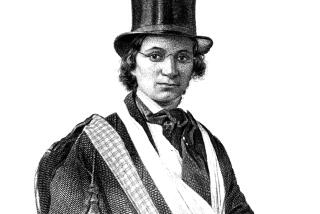Touching Tale of Tenacious Human Spirit : BOND OF IRON: Master and Slave at Buffalo Forge <i> by Charles B. Dew</i> ; W.W. Norton & Co. $27.50, 429 pages
- Share via
Abrilliant biologist can look at a drop of pond water through a powerful microscope and see the building blocks of life. An intuitive archeologist sifts through Anatolian detritus and reconstructs the daily life of Troy.
And Charles Dew, who holds an endowed chair in American history at Williams College, can painstakingly examine the crabbed handwriting of ledgers found at a backwater ironworks in antebellum Virginia and bring to touching, disturbing light aspects of the complex economic and emotional relationships that existed between slave and master.
The product of many years of detailed research, “Bond of Iron” accomplishes the seemingly impossible: Not only does it portray the turbulent interactions of ambitious, sometimes ruthless, sometimes unexpectedly humane--relatively speaking, of course--white people, but it gives equal space, and great poignancy, to individual African Americans and extended generations of their families during a period, in the Old South, when they were cruelly defined as mere property.
That Dew manages this feat at all is remarkable; that he pulls it off in the absence of any extensive diaries or personal journals is testimony to the quality both of his prose and of his rare ability to penetrate the available facts--who spent what on whom, when--and find the only possible story that explains them.
At the center of this long, thorough book is the complicated character of William Weaver, son of an antislavery Pennsylvania family, who came to Virginia in the early 19th Century. Through will and ambition--and slavery--he established a lucrative regional iron-making empire. A man with more enemies than friends, a person from whom one would want every detail of a contract in boldface print, Weaver eventually operated two charcoal-fired blast furnaces and two forges for the production of bar iron.
He owned 70 slaves outright and annually hired from other owners more than 100 more, men and women who held virtually every job in the operation after white sub-management employees uniformly proved themselves to be unreliable or less proficient. In effect, Weaver’s business created a mostly unpaid labor force of highly skilled artisans, their talents and expertise passed down from parent to child.
The evidence suggests that Weaver recognized their value and the advantage of, within the tight confines of the system, positively encouraging their cooperation as opposed to coercing it.
He assigned people to key jobs only after ascertaining their “voluntary consent” and willingness to apprentice themselves to experienced craftsmen, and “there is no indication that Weaver ever whipped one of his slave forge workers at any time during his forty years in the Valley.” Instead, he followed a policy known as paid overwork, a practice whereby a slave could earn cash or store credit by performing above and beyond the average weekly expectation of output.
Careful accounts of this accumulated capital were kept and, more than 150 years later, these records have enabled Dew to make highly educated guesses as to the daily lives and loves of people who not only survived an inhumane bondage, but found within its nooks and crannies the wherewithal to assert their devotion and loyalty to each other.
We read of the expenditure of $2 for a length of calico, of $5 for Christmas gifts for children, of $12 for wedding clothes, of sugar and coffee for aged parents--money accumulated penny by penny through backbreaking toil measured by the ton and done after 12-hour workdays or on Sundays, and it speaks of generosity and kindness beyond any largess showered by the wealthy.
Tracing purchases made over a lifetime, Dew is able to discover the personalities of individual African Americans--loving spouses, grieving children, devoted friends, small acts of grace that shine like diamonds in the blanket of silence imposed by oppression and exploitation.
“Slavery,” Dew writes, “was inherently a brutalization of the human mind and spirit. . . . The overwork system acted to minimize the use of force at Buffalo Forge, and thus is served well the needs of the master. But it also served the needs of the slaves, for they took the system and used it to enhance the quality of their own lives in ways Weaver probably could never imagine.”
Under Dew’s capable tutelage--and what a teacher he must be!--the unexpected dances on the page, correcting our stereotypes, deepening our understanding of social life and of the enduring tenacity of the human spirit under the most trying of circumstances, informing us of a time and place long denied a voice but that, once released, speaks both to the mind and to the heart.
More to Read
Sign up for our Book Club newsletter
Get the latest news, events and more from the Los Angeles Times Book Club, and help us get L.A. reading and talking.
You may occasionally receive promotional content from the Los Angeles Times.







